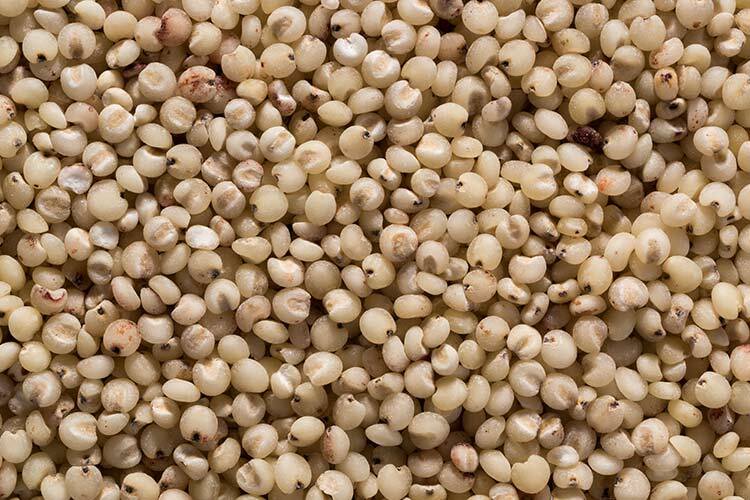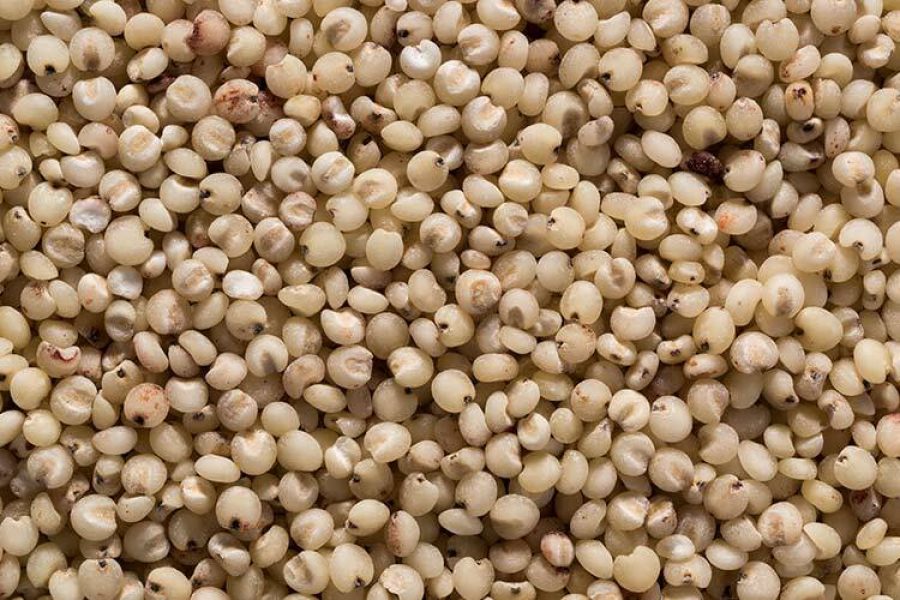By Anayansi Escalante-Aburto and Néstor Ponce-García
Kombucha, a fermented beverage originating from Asia, has gained popularity in recent years because of its health-promoting properties. Its origins date back to 200 B.C. and it has been used in various cultures for its beneficial effect on the body.
The process of making kombucha is fascinating. Tea, whether black, green, or oolong, serves as the medium upon which a community of microorganisms develops known as SCOBY (Symbiotic Culture of Bacteria and Yeast). This consortium of bacteria and yeast feeds on the added sugar in the tea, initiating a fermentation process.
The SCOBY is a gelatinous mass that forms during the fermentation process of certain foods, most commonly associated with tea fermentation to produce kombucha. It naturally forms when bacteria and yeast are introduced into a sugary liquid, such as sweetened tea. While it can be obtained pre-formed from specialty fermentation stores, it can also be prepared at home.
At present, the Toluca campus of Tec de Monterrey is researching the development of fermented products using various substrates to create high-value foods with the help of SCOBY. They are also exploring the use of kombucha residue as an alternative, protein-rich ingredient for other food matrices.
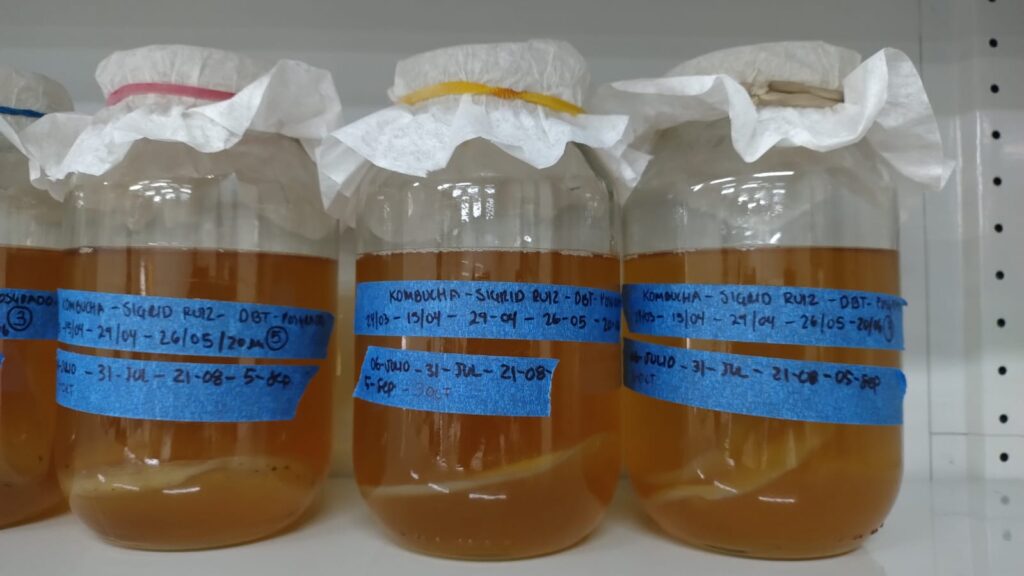
A treasure trove of bioactive compounds
Kombucha is a beverage that contains healthy substances like antioxidants and others that aid in toxin elimination. These components work together to provide health benefits and protect against cardiovascular diseases by reducing bad cholesterol oxidation, regulating cholesterol levels, and preventing hypertension.
Additionally, the substances in kombucha contribute to liver detoxification and improve its function. It’s important to note that the concentration of active components in the drink can vary depending on the SCOBY and the brewing method.
While some contraindications have been reported, controlled studies continue to investigate the positive effects of kombucha on human health.
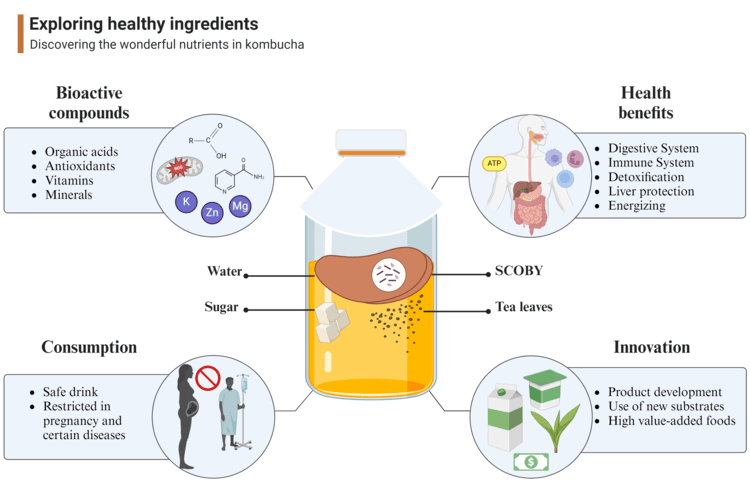
As a result of this fermentation, kombucha becomes enriched with a wide variety of beneficial compounds. Among them, we find:
- Organic acids: Acetic acid, glucuronic acid, and others, providing antibacterial and detoxifying properties.
- Antioxidants: Combat free radicals, protecting cells from oxidative damage.
- B vitamins: Essential for energy metabolism and nervous system function.
- Minerals: Potassium, magnesium, zinc, and others, involved in various bodily functions.
Kombucha has been associated with various health benefits, including:
- Improves digestion: Supports gut microbiota balance and nutrient absorption.
- Strengthens the immune system: Stimulates the body’s defense cell production.
- Detoxifies the body: Helps eliminate toxins and waste products.
- Protects the liver: Promotes liver function and detoxification.
- Increases energy: Helps reduce fatigue and boost energy levels.
Precautions and Recommendations
Consumption of kombucha is generally considered safe for healthy populations. However, the content of beneficial or potentially toxic components can vary significantly depending on the manufacturing process.
It is important to consider some precautions. If you have any preexisting medical conditions, consult with a nutrition and health specialist before consuming kombucha. Additionally, due to its small alcohol content, consumption during pregnancy is not recommended.
Home Brewing
Brewing kombucha at home is a rewarding and straightforward experience. You will need black, green, or oolong tea (5 g per liter of water), sugar (50 g per liter of water), and a SCOBY (Symbiotic Culture of Bacteria and Yeast) or pre-made kombucha (optional).
Necessary utensils include a large pot, a strainer, a clean glass container (minimum 1 liter), a clean cloth or paper towel, a rubber band, and a pH meter (optional).
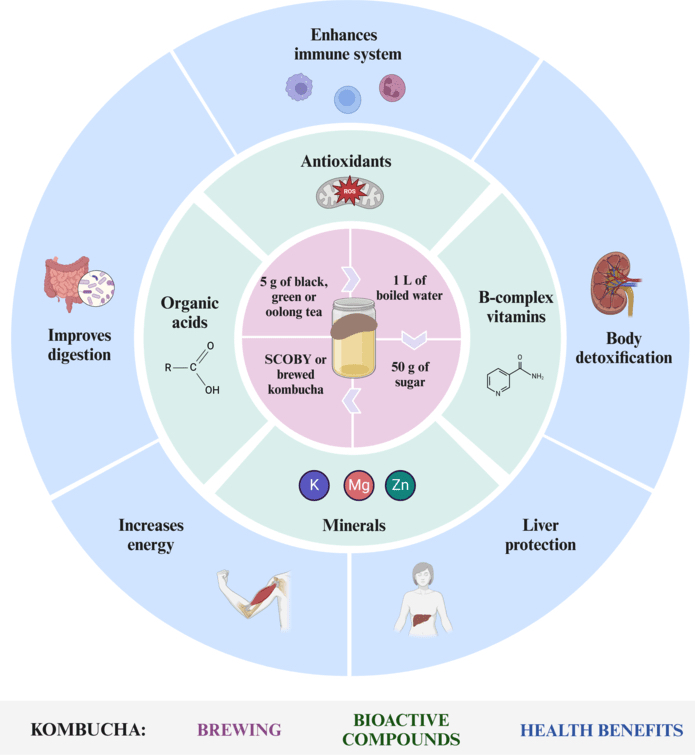
1. Tea preparation: Boil water and add the tea. Let it steep for a few minutes, then remove the leaves.
2. Sugar: Add sugar to the hot tea and stir until dissolved.
3. Cooling: Allow the mixture to cool to around 20°C (68°F).
4. SCOBY or pre-made kombucha: Place the SCOBY in the glass container. If you don’t have a SCOBY, add a bit of pre-made kombucha to kickstart fermentation.
5. Fermentation: Cover the container with a cloth or paper towel and secure it with a rubber band. Let it ferment in a dark place at room temperature (around 20-25°C or 68-77°F) for 7-10 days.
6. pH monitoring (optional): Use a pH meter to check the acidity of the kombucha during fermentation. Aim for a pH of around 4.2 to prevent excessive acetic acid.
7. Bottling and storage: Carefully pour the kombucha into clean, sterilized bottles, leaving some space at the top. Add fruits or natural flavorings if desired. Seal the bottles tightly and refrigerate to extend shelf life.
Enjoy your homemade kombucha!
.
Note: When consuming kombucha, it is important to consider some precautions. Consume it in moderation to avoid digestive issues and protect dental enamel by rinsing your mouth after drinking. If preparing it at home, maintaining good hygiene is crucial to prevent contamination. Individuals with allergies, digestive problems, or who are on medication should consult a doctor before consuming it. Additionally, kombucha may contain caffeine, which can affect sensitive individuals or those with anxiety.
References
- Jayabalan, R., Malbaša, R. V., & Sathishkumar, M. (2015). Kombucha Tea: Metabolites. In Fungal Metabolites (pp. 1–14). Springer International Publishing.
- Martínez Leal, J., Valenzuela Suárez, L., Jayabalan, R., Huerta Oros, J., & Escalante-Aburto, A. (2018). A review on health benefits of kombucha nutritional compounds and metabolites. CyTA – Journal of Food, 16(1), 390–399.
- Martínez-Leal, J., Ponce-García, N., & Escalante-Aburto, A. (2020). Recent Evidence of the Beneficial Effects Associated with Glucuronic Acid Contained in Kombucha Beverages. Current Nutrition Reports, 9(3), 163–170.
- Martini, N. (2018). Potion or Poison? Kombucha. Journal of Primary Health Care, 10(1), 93.
- Yavari, N., Mazaheri-Assadi, M., Mazhari, Z. H., Moghadam, M. B., & Larijani, K. (2017). Glucuronic Acid Rich Kombucha-fermented Pomegranate Juice. Journal of Food Research, 7(1), 61.
.
Authors
Anayansi Escalante Aburto is an Assistant Research Professor at the Institute for Obesity Research at Tecnológico de Monterrey, recognized as Level 1 in the National Researchers System (SNI) since 2018. She collaborates on projects related to the development of new products and their impact on health and nutrition.
Nestor Ponce García is a full-time professor at the Faculty of Agricultural Sciences at the Autonomous University of the State of Mexico, recognized as Level 1 in the National Researchers System (SNI) since 2017. He works on projects related to food biotechnology and the storage, processing, and industrialization of cereals and their derivatives.






